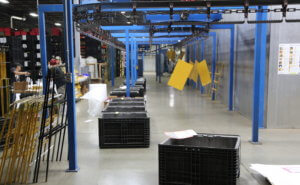Scaling Business with a Modern Fabrication Shop
March 05, 2019

In a recent article, we outlined the steps required to establish a long-lasting supply partnership between a customer and a potential modern fabrication supplier. Once the bridge has been built and the first order has moved across successfully, how do you know when it is prudent to send more business over the span?
Rather than assuming all will go smoothly, a mindful assessment process should be used to develop the proper level of trust in your new modern fabrication supplier. This is actually a continuation of the onboarding approach discussed previously. It is vital not to move forward without this second verification stage, since the responsibility for your customers’ satisfaction will now be in the hands of the supplier you have chosen. Following are some guidelines to help you determine if the affiliation has the potential for long-term growth.
Lines of communication
Communication between a customer and a supplier actually becomes even more important after the initial contract is inked. Misunderstandings and unforeseen circumstances often occur and early course corrections are vital to fine-tune the process before problems are compounded. Questions to ask yourself include:
- Do you have a designated team that is capable of handling issues?
- Is their responsiveness prompt?
- If an issue arises, are you advised ASAP?
- Are issues resolved without numerous follow-up calls?
performance as promised
Beginning with the first order to reach your loading dock, the KPI’s agreed to during the onboarding process should be applied to actual shipments. Any deviation from the promised quality, delivery times and any other key performance indicators should be noted and discussed in detail with the supplier immediately. These are very basic questions, but they should be consciously verified and noted.
- Are shipments sent on time at a previously agreed upon metric?
- Does the quality meet your standards?
- Are any concerns handled promptly?
- Does the supplier provide cost reduction suggestions when applicable?
handling the unexpected
The priorities of successful businesses fluctuate constantly. Some products may demand a high level of precision. On others, the profit margins may be thin and cost controls are essential. One of your customers may move up the delivery date for their product that you manufacture. Having a modern fabrication supplier who can quickly adapt to your needs is essential.
- Does your new supplier react well to change?
- Do they have an agile workflow to accommodate a change in priorities?
- Can they make modifications and reflow orders without hesitation?
- Can their capacity keep up with variations in your supply chain?
- Can inventory be pulled from stock quickly and efficiently?
PROACTIVE PROCESS IMPROVEMENT
A true business partner continuously improves their processes and advises you on ways to save time and money.
- Are suppliers in your network a value-adding business resource?
- Have they made an effort to learn your corporate culture?
- Are they keeping current with the latest technology available in the marketplace?
- Will they invest in capital equipment to meet your growing or special needs?
- Can they advise you of the tradeoffs between cost and quality on any given project?
a position of trust
If the answer to all the questions above was “yes,” you should be confident that you have found a supply partner that will be an asset to your business. That level of trust is the key indicator that will tell you when it is time to grow your business with them.

